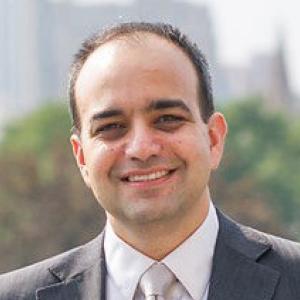
Education:
PhD in Biochemistry '01
Advisor: Terry Oas
BS in Biochemistry
McMaster University '96
Sina's lab studies the mechanisms of protein folding and degradation within cells and investigates how cells maintain a balance between these two processes, and how this homeostasis is affected by disease and aging.
On Choosing Duke
I was interested in protein biochemistry, and Duke had a fantastic reputation and rich history in that area. There were scientists from the department who had made significant contributions to protein biochemistry including, Charles Tanford, the Richardsons, and Irwin Fridovitch. There was also a new crop of protein biochemists and structural biologists doing very exciting work. But I was sold on Duke when I came to campus. Everyone was friendly, and the faculty spoke with me at length to understand my interests and background. These were important reasons why I accepted their offer.
About the Duke Experience
I was at Duke for five and a half years and did my PhD under Dr. Terry Oas. His lab was small, which provided a very personalized education, a lot of one-on-one mentoring, and time and space to grow as a scientist. I feel like my PhD education was a great combination of cutting-edge research and old-school, rigorous biochemistry and I’ve tried to emulate that combination throughout my career.
Landing at the University of Rochester
During my PhD, I studied protein folding and stability using in vitro biochemical assays and mass spectrometry. After graduate school, I wanted to learn how to work with a model organism, so I did a postdoc at the University of California, San Francisco (UCSF) in Dr. Jonathan Weisman’s lab. There, I learned yeast genetics which allowed me to move into the field of functional genomics.
I stayed at UCSF for a few more years as an adjunct research professor and honed my skills in mass spectrometry-based proteomics. And in 2012, I was hired by the University of Rochester’s biology department, where I’m now an associate professor. My current research involves analyzing cellular pathways related to protein homeostasis using mass spectrometry-based proteomics.
Being Ready for Academia
My graduate experience prepared me for an academic career—receiving a solid education in the foundations of biochemistry and having the opportunity to learn several biochemical techniques. In many labs in the department, much of the research was being done by graduate students, so the PIs encouraged us to develop independent projects and provided the required mentoring to make sure they were successful.
I also got a chance to mentor undergraduates and younger graduate students in the lab, plus as part of a biophysics training program, I had many opportunities to present my research in different settings—all useful skills to have in academia.
The Oas Lab Influence
There’s no doubt I was influenced by how Terry ran his lab, and in ways, mine bears some resemblance to his. My lab is relatively small, and I’m interested in my grad student’s independent ideas, support their experimentation and exploration of new areas, and encourage them to take on their own projects. Scientifically, Terry instilled in me a love of physical chemistry. Because of his influence, when we come up with a biological model, we feel compelled to do the proper math and make sure it is compatible with basic principles of kinetics and thermodynamics. But what I’m most proud of; is that I too value my personal relationships with students as Terry does. He taught me to take my role as a mentor very seriously.